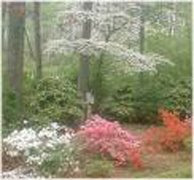Creating an Organized and Low Maintenance Garden

Once spring is in full swing, those of us who love to garden really get the itch to dig in the dirt. Every April and May, I enjoy the pink and white blooms of my azaleas and the variegated leaves of my hostas as they poke out of the ground.
And, of course, I have to pull a few weeds, the clutter of the gardening world. But it recently occurred to me that my garden is getting easier to maintain each year because of the planning and planting that I did over a decade ago. You see, if you put the right plants in the right places, your garden will practically maintain itself. This concept mimics some of the basic principles of organizing: (a) put items where they should logically live and (b) use the best solutions for the space available.
Here are a few tips for an organized garden that will save you time, money, and energy:
- Use perennials and shrubs liberally. Perennials are plants that come back year after year. They may be more expensive in the short run, but these plants will more than pay for themselves long-term because, unlike annuals which have to be purchased and planted each year, perennials only have to purchased once. And many of them get large enough over time that they can be divided and placed into other parts of your garden. I have hostas that I've divided many times over the years. This saves me money because the original plant investment keeps producing more plants for my garden over time.
- Use native plants whenever possible. Native plants are those that grow naturally and happily in the soil and weather conditions that they are planted in. They are adapted to your local conditions and, therefore, require less fertilizers, pest controls, and watering. Plus, they will benefit the environment by offering appropriate food, nectar, and cover for local birds, butterflies, and other little critters. If you get lured into using non-native exotic plants in your garden, expect to spend time helping them to survive. I liken using exotics to sticking me, a very southern woman, in Michigan for the winter. I am simply not used to being in snow for more than a few days at a time and would be absolutely miserable. I can, however, happily thrive in Atlanta's hot, humid summers because my system has adapted to these conditions.
- Put the right plant in the right spot. Most plants purchased from a nursery come with a short description of their preferred sunlight conditions, the recommended distance to plant apart from other plants, and an approximation of their size at maturity. Keep these factors in mind as you design your garden. Don't waste time and money putting a "full sun" plant in dappled shade. It may look okay for one season but it will eventually become leggy and won't flourish. On the opposite end of the spectrum, don't put shade lovers in full sun unless you want to watch them get brown and crunchy as the season progresses. If you put a plant in a spot where it has room to grow in the conditions it likes to live in, you'll end up with a happy plant that requires very little maintenance.
- Relax and let your garden grow. If you've put the right native plants in the right conditions, they will flourish naturally. I prefer not to use chemicals in my garden, and the droughts we've experienced in the southeast have restricted my ability to water. That means that once a plant is established in my yard, it has to hold its own or it doesn't get to stay. This trial and error, survival-of-the-fittest approach has taught me what will and will not work in my garden. I put my time, money, and sweat equity into what I know will easily grow.





